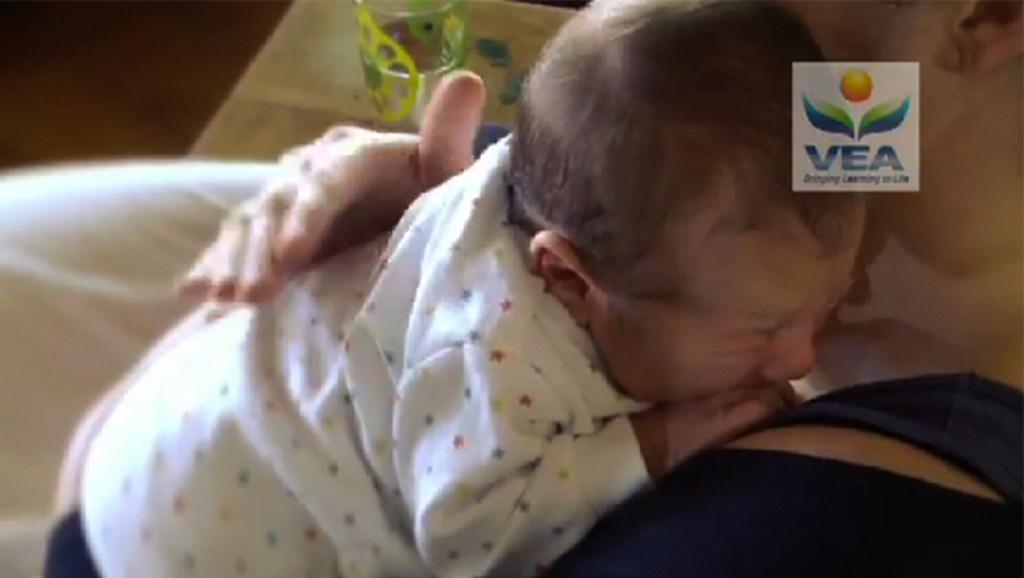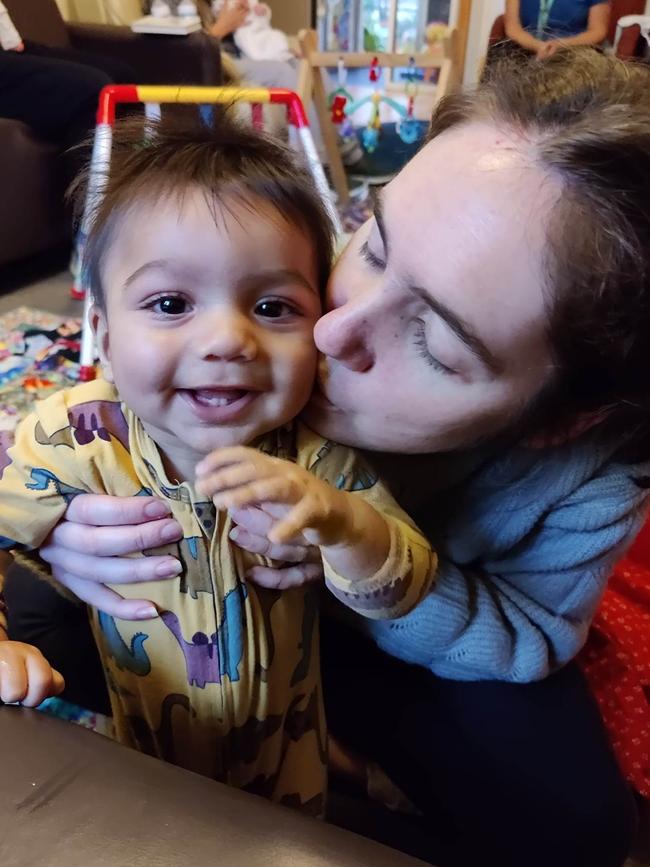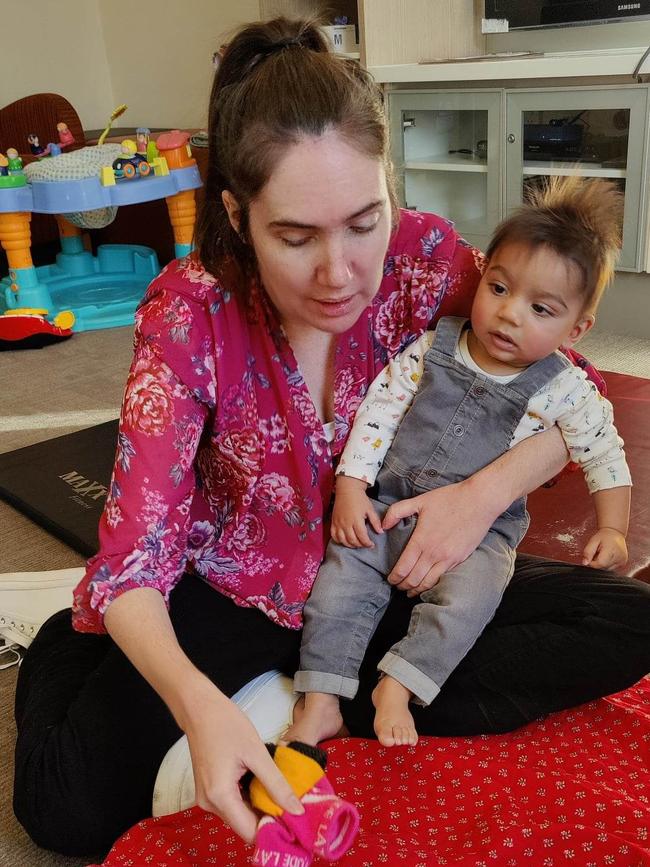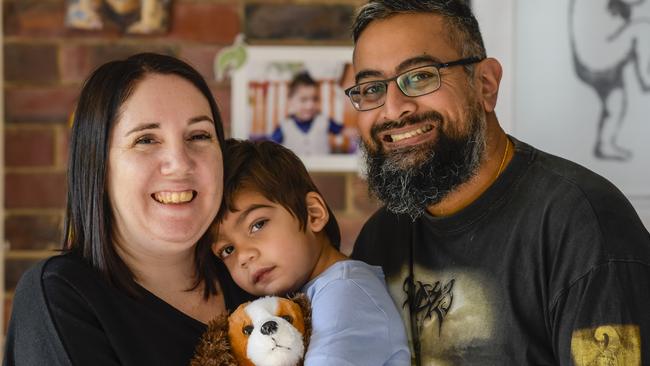Postnatal depression threatened to kill Adelaide mum Belinda Wahry – until she found Helen Mayo House
Electroconvulsive therapy sounds frightening, but this Adelaide mum says it saved her from losing her life to postnatal depression.

Lifestyle
Don't miss out on the headlines from Lifestyle. Followed categories will be added to My News.
The horrifying thought first crept into Belinda Wahry’s mind as she sat on the floor, playing with her three-month-old son.
“I remember thinking ‘I want to die’. But then I have to be here for my child, and how can I put him through so much pain?” she recalls.
“I remember just looking at his face and I would just cry.”
This anguish was the culmination of more than a year of anxiety, stress and guilt that had been building since Belinda’s journey to becoming a mum began.
The now 39-year-old and her partner Ronick Hirani, also 39, were devastated when it was discovered that their first pregnancy was ectopic.
The egg had implanted in Belinda’s fallopian tube, rather than her uterus, and the baby would never have been able to develop.
About four months later she fell pregnant again – with their son Toby, who is now Two-and-a-half – but her anxiety only grew.
“I remember being so happy when the positive test came back, and then the fear, is it in my (fallopian) tube again? It was just fear, constant fear,” she says.
“I remember telling myself the whole pregnancy ‘I’ll be happy when this baby is in my arms’.
“But I never was happy, I was always on the edge, always scared. I just felt from the word go that I was a bad mum. I know it’s not logical but to me, at that time, I felt like I was putting him at risk. In hindsight I should have spoken to someone then, but I didn’t.”


That first day and night in hospital after Toby was born, Belinda remembers being “awake for 24 hours with a starving, crying baby” and struggling with breastfeeding.
“That very first morning it hit me, being a mum, just feeling overwhelmed and thinking what do I do? I just cried and broke down in front of the midwife. I just said I cannot do this, I can’t,” she says.
After six weeks, Toby’s parents decided to switch to formula feeding and he began “thriving”, but Belinda felt like she was drowning.
“Then one day I just couldn’t get out of bed. I couldn’t fake it anymore, I couldn’t get through it. I couldn’t physically move. I didn’t know what was happening to me,” she says.
“I just felt inside that something was wrong. I dreaded facing the day, what would happen, am I good enough to handle what the day had to offer?” she says.
Belinda, who is a nurse, tried speaking with her GP but says she felt she “just wasn’t listened to” so, when Toby was about 12 weeks old, she went to the emergency department.
By this point she was experiencing severe abdominal pain and vomiting which she now believes was caused by extreme anxiety.
It was these physical symptoms that hospital staff focused on and after a week of scans and other tests she was discharged.
“I came home and I just woke up one morning and I was suicidal,” she says.
“I remember playing with Toby and I was just like ‘I want to die’. I felt like I was being torn to pieces … I think deep down I knew it was wrong, that’s not how I should be feeling. I didn’t want to tell Ron because I didn’t want to scare him (but) I needed to tell someone.”

Despite her “sense of shame”, Belinda picked up the phone and called the PANDA helpline. An experienced counsellor answered and “made me feel like it’s not my fault”.
They offered to talk to her partner and advised the family to return to hospital straight away. Belinda was admitted to the Lyell McEwin acute mental health unit and assessed by a psychologist who referred her to Helen Mayo House.
She had to wait almost three weeks, and then stayed in the mother-baby unit with Toby for about a month. But she had to leave abruptly to visit her seriously ill father interstate.
After returning to Adelaide it became clear Belinda needed more treatment and she and her son were re-admitted for another six weeks.
“Being there with Toby was a blessing, that was so vital to my healing, just being able to be with him at the same time as getting help, because I did have that guilt of not being there for him. I think it would have been a lot worse (if they were separated).”
There are just six beds available at Helen Mayo House, where parents struggling with significant mental distress can be admitted with babies in their first year of life.
Last year, 64 parents and 66 children – including twins – were admitted to Helen Mayo House. Each year between 60 and 100 patients spend time there, ranging from teenage mothers aged 16 or 17 to women in their 50s.
On average, a mother and baby will stay for two to three weeks but it is not uncommon for patients to stay for months. Because of this there are usually five to 10 families on a wait list, and this can blow out to 15 or 20.
Given the dire need for this small but lifesaving service, there are plans to double capacity to 12 beds when Helen Mayo House moves to the site of the new Women’s and Children’s Hospital.
Severe depression and anxiety are the most common reasons parents are admitted but Helen Mayo House medical unit head Dr Hill says they see cases of post-partum psychosis or pre-existing bipolar disorder and schizophrenia too.
That is more than 100,000 new parents around the country each year.
In addition, more than half of all new parents will experience what is known as an adjustment disorder as they confront the reality of life with a newborn.
Suicide remains a leading cause of death among expectant and new mothers.
‘It does sound quite extreme but it does work’
During her time at Helen Mayo House Belinda underwent electroconvulsive therapy (ECT) and described the effect as “almost like a curtain being drawn and I could see Toby and felt that love surging back”.
“It does sound quite extreme but it does work,” she says.
“If you have cancer for example, chemotherapy is not nice but you have to do it to fight. That’s what you need to do with ECT.”
Dr Hill says the procedure involves putting a patient under general anaesthetic and inducing a seizure which results in the release of neurotransmitters in the brain. This is thought to work in the same way as medications but is “a much more powerful release”.
“The major features of ECT are that it is rapid and highly effective, both of which are things you want when someone is missing out on time with their baby,” Dr Hill says.
“It is probably the most commonly performed procedure in the world. People have it three times a week … (and) everyone who has it probably has six to 12 treatments. But no one really talks about it much in the community.
“Sometimes it is lifesaving if people are so suicidal that we can’t necessarily even guarantee their safety in a mental health unit. Or if they’re not eating and drinking. To be better within a couple of weeks is much better than taking weeks and weeks of medication.”
Belinda also spoke with a psychologist and social workers, began taking medication and took huge comfort in the support of other “warrior” mothers living at Helen Mayo House.
Ronick visited every day, including staying overnight when he could, and felt partners were welcomed and supported there too.
“(At Helen Mayo House) there was no stigma, it was just full-on support,” Belinda says.
“I could talk to them without judgment. In reality, they saved my life. Just being there saved me.”
Now that she is well, Belinda realises that she was going through the motions in the first few months of her son’s life.
“When I look back at the photos of when I was sick I’m disappointed that I missed out on that time to really love him,” she says.
“I got him fed, changed his nappy, he was safe … I was doing the job. (But) it’s totally different now. My heart melts when he laughs. I can’t stop smiling when I think about him. I love him so much.”
More Coverage
Originally published as Postnatal depression threatened to kill Adelaide mum Belinda Wahry – until she found Helen Mayo House





